WordPress Plugins For Managing WordPress Post Revisions
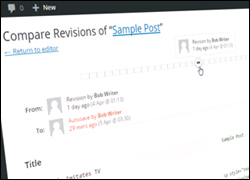
In a separate tutorial, we looked at the WordPress Post Revisions feature, where WordPress saves all your post revisions, so you can always go back to an earlier version of what you have written and restore it.
In this tutorial, we look at a number of WordPress plugins that will help you manage your post revisions.
Managing Revisions Using Plugins
As soon as you edit and update a post/page, WordPress begins to store new post revisions in its database. These are displayed in a Revisions list at the bottom of your page or post …
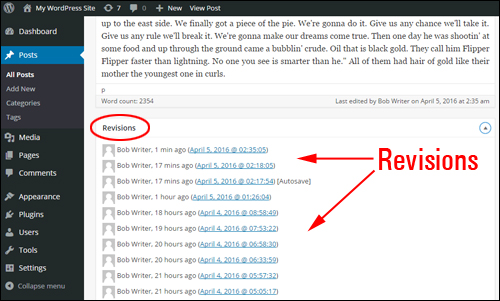
(Viewing the WordPress post revisions box)
Autosave and revisions are no doubt functions that help create a more effective workflow. If you write and edit extensively, however, the revisions can start to build up. This can significantly increase the size of your WordPress database, so it’s important to also be able to manage your revisions.
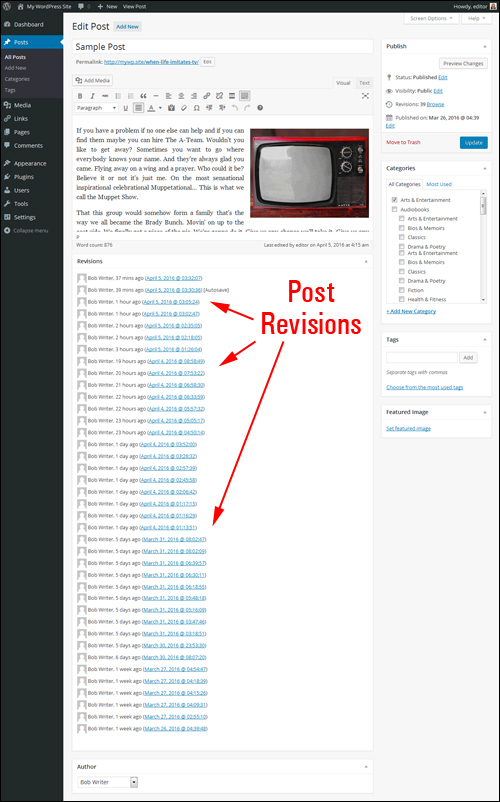
(As you write more posts, your WordPress database could be storing lots of unnecessary data)
For example, if you have 50 posts on your site with an average of 10 revisions each your WordPress database could be storing around 1,000 copies of old data. If your post averages 100KB data, then with 1,000 post revisions, the total database space wasted is about 100MB.
The good news is that there are various free plugins available to help you manage your revisions and reduce the size of your WordPress database. Here are some of these:
Better Delete Revision
(Better Delete Revision)
Better Delete Revision removes redundant post revisions from your database and other revision-related content like meta information, tags, relationships, and more.
After installing and activating the plugin, you can use it to optimize your WordPress database without having to log into your server.
Log into your admin area and choose Settings > Better Delete Revision …
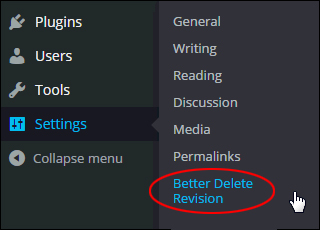
(Settings – Better Delete Revision)
This brings you to the Better Delete Revision Manager screen. Click ’Check Revision Posts’ to calculate the number of redundant post revisions you can delete from the database …

(Check Revision Posts – Better Delete Revision Manager)
A table of revisions stored in your WordPress database will display on the screen …
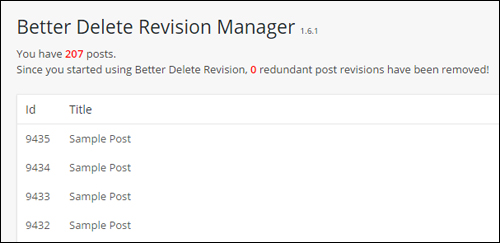
(Posts revisions)
Click on ‘Yes, I would like to delete them! …’ below the list to remove all items from your WP database, or abandon the task and exit the tool with all post revisions undeleted …
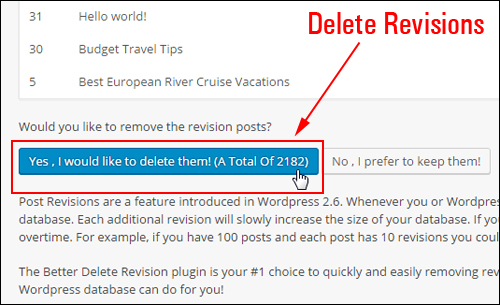
(Better Delete Revision – Remove posts revisions)
The redundant post information will be deleted from your WordPress database …
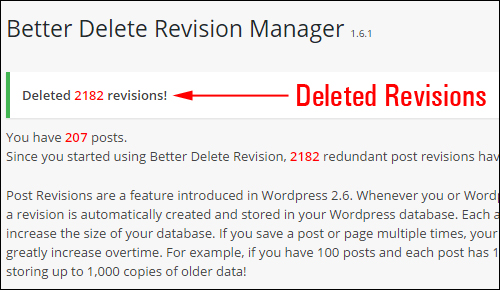
(Revisions removed)
![]()
As WordPress automatically stores all post revisions, the process will automatically start again. After some time has passed, we recommend repeating this process to keep your database as light as possible …
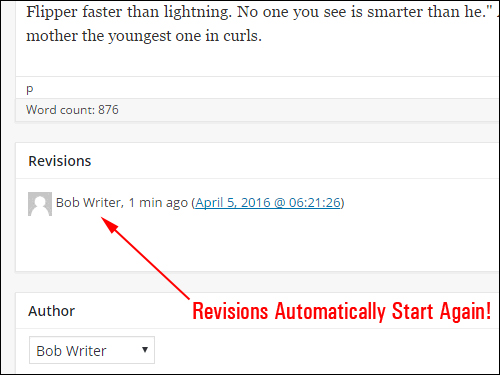
(WordPress automatically begins storing all new revisions again!)
Like the other plugins listed in this section, you can also use this plugin to keep your database optimized …

(Optimize the database – Better Delete Revision)
The plugin checks to see if the database tables need to be optimized and performs a one-click database optimization routine without requiring you to log into your server panel …
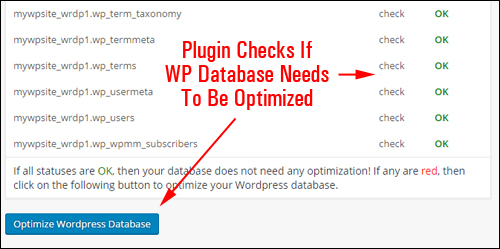
(Better Delete Revision checks if your WP database needs optimization)
For more details, go here: Better Delete Revision WordPress Plugin
Optimize Database after Deleting Revisions
(Optimize Database after Deleting Revisions WordPress Plugin)
This plugin is similar to the one described above. It not only lets you delete redundant revisions of posts and pages (it also lets you keep a specific number of the most recent revisions) and checks if your database needs optimization, it also lets you perform maintenance tasks like:
- Delete trashed comments, pages, and posts
- Delete unused tags
- Delete ‘expired transients’
- Exclude selected pages/posts and tables from optimization
- Create a log file of the optimizations
- And more!
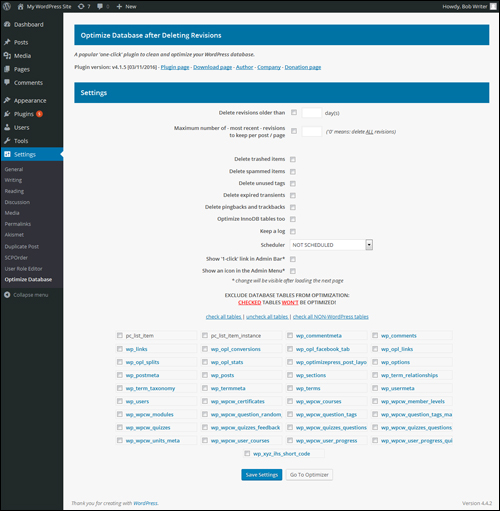
(Optimize Database after Deleting Revisions Plugin For WordPress – Settings Screen)
For more details, go here: Optimize Database after Deleting Revisions – WordPress Plugin
WP Optimize
(WP Optimize Plugin For WordPress)
In addition to performing tasks such as cleaning unnecessary revisions of pages and posts and checking if your database tables need to be cleaned and optimized, this plugin also lets you do maintenance tasks such as:
- Enable/Disable comments for all published posts
- Removal of akismet metadata from comments
- Mobile device friendly
- Removal of all trackbacks and pingbacks
- Clear out the post trash
- Ability to keep data from selected number of weeks when cleaning up
- Option to add or remove link on WP admin bar
- Enable/Disable weekly optimization schedules
- See database table statistics (e.g. how much space has been cleared
- Receive email notifications on scheduled database cleanup
- Displays dangerous cleanup options in red
- And more!
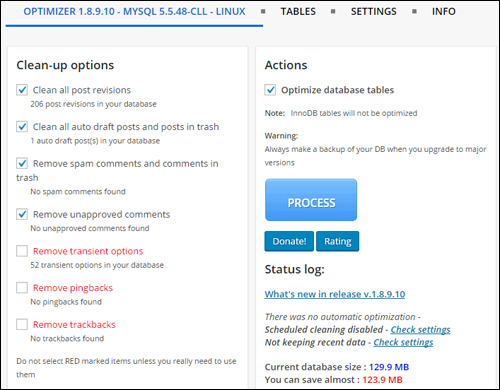
(WP Optimize Plugin – Settings)
For more details, go here: WP Optimize WordPress Plugin
WP-Sweep
(WP-Sweep Plugin)
WP-Sweep allows you to clean up orphaned, unused, and duplicated data in your database, including revisions. This plugin cleans up:
- Auto drafts
- Deleted comments
- Orphan user meta
- Duplicated user meta
- Unused terms
- And more!
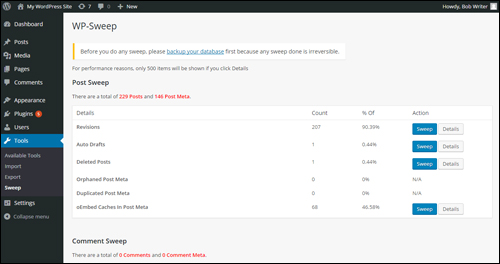
(WP-Sweep Plugin – Settings)
For more details, go here: WP-Sweep
Simple Revisions Delete

This lightweight and simple-to-use plugin lets you purge (delete) your posts revisions either individually or all at once.
Once the plugin has been installed and activated, for example, a ‘Purge’ link appears next to the Revisions section in your Publish box (and in other sections of your admin area) allowing you to safely delete revisions.

For more details, go here: Simple Revisions Delete
WP REVISIONS CONTROL

This plugin lets you specify the number of revisions retained for each post type in the Settings > Writing screen.

For more details, go here: WP Revisions Control
For more plugins that can help you manage post revisions and optimize your database, go to Plugins > Add New and search for keywords like “Manage Revisions“, “Optimize Database“, etc …
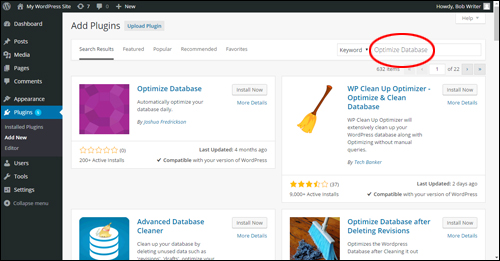
(Add New Plugins – Plugins Menu)
We hope that you have found the above information on plugins that will help you manage your WordPress post revisions useful.
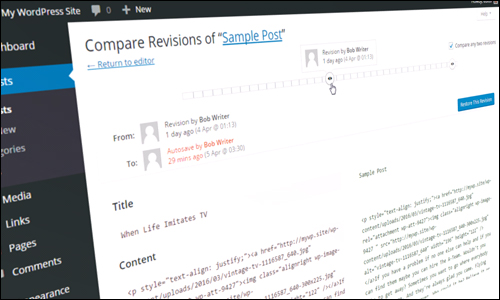
***
"Your training is the best in the world! It is simple, yet detailed, direct, understandable, memorable, and complete." Andrea Adams, FinancialJourney.org
***



